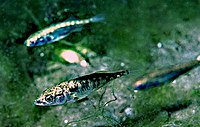
Photo from wikipedia
It is widely recognised that eco-evolutionary feedbacks can have important implications for evolution. However, many models of host-parasite coevolution omit eco-evolutionary feedbacks for the sake of simplicity, typically by assuming… Click to show full abstract
It is widely recognised that eco-evolutionary feedbacks can have important implications for evolution. However, many models of host-parasite coevolution omit eco-evolutionary feedbacks for the sake of simplicity, typically by assuming the population sizes of both species are constant. It is often difficult to determine whether the results of these models are qualitatively robust if eco-evolutionary feedbacks are included. Here, by allowing interspecific encounter probabilities to depend on population densities without otherwise varying the structure of the models, we provide a simple method that can test whether eco-evolutionary feedbacks per se affect evolutionary outcomes. Applying this approach to explicit genetic and quantitative trait models from the literature, our framework shows that qualitative changes to the outcome can be directly attributable to eco-evolutionary feedbacks. For example, shifting the dynamics between stable monomorphism or polymorphism and cycling, as well as changing the nature of the cycles. Our approach, which can be readily applied to many different models of host-parasite coevolution, offers a straightforward method for testing whether eco-evolutionary feedbacks qualitatively change coevolutionary outcomes.
Journal Title: Journal of theoretical biology
Year Published: 2019
Link to full text (if available)
Share on Social Media: Sign Up to like & get
recommendations!